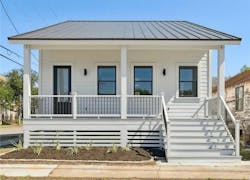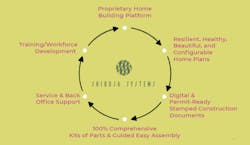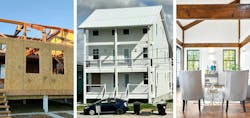A System that Takes Developers and Builders from Design to Completion
When the team behind the design-build company Shibusa Systems researched the causes of the U.S. housing crisis, they determined that the escalating costs of land and materials weren’t the main issue. “We found the fundamental reason was the lack of skilled labor,” says Kathryn L. Reynolds, cofounder, president, and CEO, Shibusa Systems.
The New Orleans-based startup has developed a homebuilding process that helps address the labor shortage. “We created a system to encourage more people to go into homebuilding and to encourage those in it to stay in it and have a more lucrative career,” Reynolds says.
For Shibusa, “system” is the keyword: Its end-to-end system supports developers and builders through the entire process, from design through completion. As a result, it takes about five workers six to eight weeks to build a 1,000-sf Shibusa home—compared to 15 people taking six months with conventional construction, Reynolds says. The upshot? “Fewer people can build many more homes per year.”
The ultimate goal, Reynolds explains, is to make homebuilding both more profitable and more enjoyable for smaller builders. So, instead of having to focus on high-end homes or renovations, these builders can supply housing for teachers, first responders, agricultural workers, and others who have “the greatest housing need,” she says.
“We believe our product is more informed by building science than anything else on the market,” says Reynolds of Shibusa Systems, which was founded in 2019.
Shibusa Systems’ Labor Solution for the Housing Crisis
Here’s how the system works:
- On Shibusa’s online portal, developers select from various housing models. Currently, Shibusa has a few available models but eventually will provide options ranging from an accessory dwelling unit (ADU) to a three-story quadruplex. By mid-2025, subdivision developers will be able to buy an annual subscription to Shibusa’s portal, although users won’t need a subscription to order one-off homes or ADUs.
- On the portal, users configure their model. For instance, they select the siding, roofing, and windows, as well as interior elements such as cabinets, countertops, and floors.
- The portal sends the completed design out to bid to all the Shibusa-certified builders in the area. To become certified, a builder must go through Shibusa’s training program, which will involve videos that builders can access in the field via an app. Certified builders also can subscribe to Shibusa so they can bid for projects on its portal.
- Bidders provide their quotes, timelines, and contact details, so the developer and builder can connect and discuss the project. “Homes are one of the most expensive and emotional purchases, even if you’re a developer building units that you’ll sell or lease, so we try to provide a more human touch,” Reynolds said.
- Shibusa’s system sends the bill of materials and digital drawings to the designated suppliers of its proprietary elements: the heavy timbers, structural insulated panels (SIPs), light-gauge steel framing, and prefabricated plumbing wall. All the other building materials are standard.
- Shibusa provides the builder with permit-ready construction drawings and all the parts the builder will need, including the framing system, which is assembled onsite. “We turn construction into assembly as much as possible,” Reynolds says.
- On Shibusa’s app, the builder can access all the work activities for the crew each day. The builder can use the app to record delays and progress. Shibusa also provides builders with a back-office enterprise resource planning (ERP) system.
Shibusa’s cofounders located their startup in New Orleans, Reynolds explains, because of the area’s need for low-cost, high-performance homes that could hold up to harsh climate conditions. Shibusa’s homes are all electric, can be net zero with additional solar, and can withstand winds of at least 150 miles per hour.
In Louisiana, a Shibusa home is about 20% less expensive to build than traditional construction. And in California, where Shibusa will soon break ground on a development, the company can deliver housing for an all-in cost of $350 per square foot—in an area where conventional construction runs $500 per square foot, Reynolds says.
So far, Shibusa has built nine houses in New Orleans that range from two-bedroom, two-bathroom shotgun units to a three-story, 3,000-sf duplex. In the future, Shibusa plans to partner with financial institutions to provide construction financing and insurance products. And within the next five years, Shibusa aims to enable builders to have constructed 10,000 high-performance homes.



